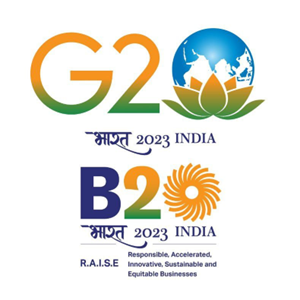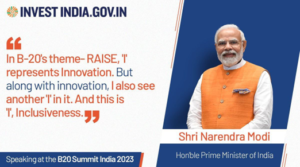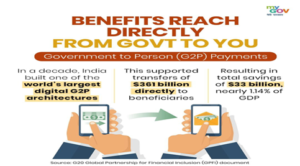Business Action Crucial for G20 Objectives.
Relevance
- GS 2: Bilateral, Regional, and Global Groupings and Agreements Involving India
- GS 3: Indian Economy and issues related to planning.
- Tags: #G20Progress #FinancialInclusion #ESGFrameworks #mint #UPSC #G20.
Why in the News?
India’s G20 presidency marked a pivotal moment in global collaboration, addressing sustainable development challenges under the theme ‘Vasudhaiva Kutumbakam’ ,highlights the significant recommendations and synergies between B20 and G20 initiatives.
G20 India Presidency and B20 Engagement
India’s G20 presidency coincided with challenges in achieving sustainable development goals. Prime Minister Narendra Modi’s leadership resulted in significant progress.
- The theme, ‘Vasudhaiva Kutumbakam’ (One Earth, One Family, One Future), set new standards for global cooperation.
- The Business 20 (B20) engagement group, hosted by the Confederation of Indian Industry (CII), provided recommendations to the G20.
- With over 1,500 members from G20 and invitee countries, B20 focused on Responsible, Accelerated, Innovative, Sustainable, and Equitable Businesses (RAISE), reflecting key priorities for the future.
B20 Aligns with G20 Objectives
The B20 task-forces focused their efforts on industry priorities that closely aligned with the broader G20 issues.
- In total, the B20 platform generated 54 recommendations and 172 policy actions for the G20’s consideration.
- It is particularly satisfying to observe the strong harmony between the proposals put forth by B20 India and the content of the New Delhi declaration at the G20 Summit.
- This alignment highlights the effective collaboration between the business community and governmental leaders in addressing critical global challenges.
B20 Proposes Measures for Global Economic Recovery
First – Alternative Financing Instruments
- The B20 has advocated for using alternative financing instruments, mixed financing, and the use of technology and digital platforms to improve MSME access to credit and ensure money for sustainable and resilient infrastructure.
- It was suggested by the G20 trade ministers to strengthen an MSME information site.
Second – Resilient Global Value Chains
- The B20 emphasized the importance of creating strong and inclusive global value chains.
- They suggested measures for handling crises better and using technology to detect risks early.
- They also highlighted the significance of services trade, advocating for improved data, clear definitions, and transparent compliance procedures.
- The G20 trade ministers echoed these ideas in their outcome document, emphasizing efficiency through technology in cross-border trade.
- The G20 declaration underscored the need for sustainable, inclusive, and resilient global value chains and easier business practices, aligning with B20’s recommendations.
Third – Digital Public Infrastructure (DPI)
- Ecosystem enablers, financial products, and legislative and regulatory initiatives all highlighted the importance of financial inclusion.
- The promotion of financial inclusion can be aided by the use of digital public infrastructure (DPI), which enables MSMEs and individuals to be uniquely identified digitally and recognized across national borders.
- The Indian experience served as a model for DPI, a significant component of the G20 agreement.
Fourth – Skills Development and Workforce Mobility
- The G20 can address environmental sustainability, climate change adaptation, and the care economy.
- Removing policy obstacles and leveraging technology for cross-border labor mobility are essential.
- The leaders’ declaration emphasized well-managed skill-based migration paths and mapping global skill gaps to facilitate a more skilled and mobile global workforce.
Fifth – Achieving Net-Zero Emissions and Climate Resilience
- The G20’s energy, climate change, and resource efficiency forum concentrated on achieving net-zero emissions across various industries and proposed industry-specific partnerships.
- A key focus was strengthening multilateral development banks to aid energy transitions in emerging economies.
- The document highlighted adaptability and resilience, aligning with B20 views on climate change, and emphasized differentiated country actions to combat climate challenges.
Sixth – Digital Transformation, Connectivity, and Cybersecurity
- The G20 prioritized digital transformations, aiming for high-quality, reliable internet access.
- Establishing global digital literacy standards can enable international mobility.
- An internationally recognized digital toolkit can aid MSMEs in their digital journeys.
- Collaborative efforts are required to build digital trust through harmonized cybersecurity standards and frameworks, emphasizing the importance of cybersecurity in the digital age.
Seventh – Promoting Tech, Innovation, and R&D Cooperation
- Creating a shared repository of projects can foster learning, adoption, and collaboration among G20 nations.
- Considering a unified patent protection system and centralized patent management for all G20 countries could enhance innovation.
- Additionally, establishing a G20 technology collaboration platform would facilitate the transfer of technology and research & development across various sectors, including industry, institutions, startups, and civil society.
Eighth – Harmonized ESG Frameworks
- The B20 advocated a common set of definitions and classifications to enable standardized and transparent ESG frameworks for disclosures, reporting, and rating since ESG is a crucial future requirement.
Ninth – India’s Support for African Union in G20
- It was very encouraging that India led the charge for the AU’s inclusion in the G20, guaranteeing that it did so.
- The B20 suggestions also addressed infrastructural development, industrialization, agricultural reform, and assistance for education.
- These issues would gain enormous momentum with the AU’s involvement in G20 discussions going forward.
B20 India: Proposals for Global Progress
B20 India introduced four significant proposals –
- Global Institute for Recommendation Tracking: Suggesting a global institute to monitor and implement recommendations, ensuring consistency across B20 presidencies.
- Sector-Specific Decarbonization Pathways: Aiming to align decarbonization strategies for key sectors.
- Global SDG Acceleration Fund: Recommending the creation of a fund to attract private investment for projects working toward achieving the 2030 Sustainable Development Goals (SDGs).
- Innovation Best Practices Portal: Compiling a collection of innovation use cases to launch an ongoing technology portal for development. These proposals aim to drive global progress.
The B20 remains dedicated to collaborating with the G20 to shape effective policies for inclusive development, benefiting businesses, especially in the Global South.
Source: Livemint
Mains Question
Highlight the priorities identified by the B20 task-forces and their alignment with the larger G20 issues. How can these priorities contribute to global economic recovery and resilience?







